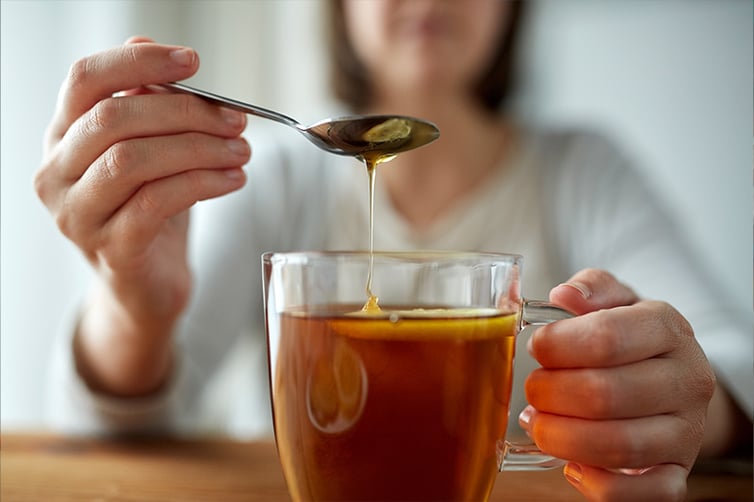Wanna hear something sweet? September is National Honey Month! Back in 1989, the National Honey Board officially began the observance of National Honey Month in order to promote awareness for beekeepers across the country. September was chosen as the month of celebration because it usually marks the end of annual honey collection when bees settle in to secure their hives for the winter.
In recent years, there’s been a lot of buzz around the importance of bees. Bees play a vital role in the ecosystem by aiding in plant reproduction. In turn, beekeepers play a vital role in nurturing the health and reproduction of bees. So, if we want to support bees, then it makes sense to support local and national beekeepers — by buying honey!
But using honey isn’t just good for bees and beekeepers. It’s good for you too. Let’s celebrate National Honey Month by taking a deeper look at the healthy properties of honey and brainstorming some ways to use honey as part of a healthy diet.
Honey’s Awesome Qualities
According to research recorded by the National Library of Medicine, the secret of honey’s health benefits can be traced to “its antibacterial, anti-inflammatory, apoptotic, and antioxidant properties.” That all sounds impressive. But what do those words mean, practically speaking?
.jpg?width=713&height=201&name=honey%20qualities%20(1).jpg)
Antibacterial: In general, something that is antibacterial inhibits the growth and spread of bacteria. In the case of honey, that means it’s been shown to stop the growth of harmful bacterial pathogens and fungi.
Anti-inflammatory: Because inflammation is linked to delayed healing and damaged tissues, anything with anti-inflammatory properties is good for the body. Honey helps to reduce inflammation in the body by suppressing inflammatory chemicals and regulating the proteins that cause inflammation to occur.
Apoptotic: Apoptosis is the natural function of the body to rid itself of cells. Without apoptosis, bad cells (such as cancer cells) may be permitted to grow and divide rather than be destroyed as they should. Honey supports apoptosis by inducing the expression of various proteins necessary for the process to occur naturally in the body.
Antioxidant: Antioxidants help to fight harmful free radicals, such as molecules from broken-down food, tobacco exposure, or radiation. Free radicals damage cells if their levels become too high. Active compounds in honey have been shown to have antioxidant properties, helping to neutralize those free radicals. Darker honeys have higher levels of antioxidants than lighter honeys.
Honey’s Health Benefits

Because of all these amazing properties, honey has been associated with some pretty great health benefits, particularly in the following areas:
Cough relief: A teaspoon of honey can help quiet a nagging cough before bedtime. A study conducted by the Penn State College of Medicine found that “honey given before bedtime provided better relief of nighttime cough and sleep difficulty in children than no treatment or dextromethorphan (DM), a cough suppressant found in many over-the-counter cold medications.”
Asthma: Similarly, honey may help calm asthma-related symptoms by reducing inflammation in the airways and even inhibiting the onset of asthma attacks, according to research published in the National Library of Medicine.
Cardiovascular disease: Because of its antioxidant properties, honey can help in reducing the risk of cardiovascular disease. Free radicals cause oxidative stress, which can lead to heart attacks; honey aids in ridding the body of that harmful potential.
Neurological disease: Studies indicate that honey is useful in protecting the nervous system by reducing the oxidative content. In addition, honey has the possibility of improving memory functions by reducing neuroinflammation in the hippocampus, the memory part of the brain. Antidepressant and anticonvulsant properties have also been observed, but more detailed research is needed overall.
Cancer: Research indicates that honey may have anticancer benefits, due in part to its ability to induce apoptosis (the necessary decomposition of bad cells). Though not fully understood at this time, honey’s anticancer effects have been observed on many types of cancer cells, including melanoma, colorectal cancer, prostate cancer, cervical cancer, leukemia, mouth cancer and more.
Gastrointestinal issues: Honey can be useful when someone has a stomach bug. Researchers report that honey shows therapeutic benefits in the treatment of infants and children who went to the hospital with gastroenteritis. Clinical results indicated “remarkable reduced duration of diarrhea in the honey-treated patients.”
Wound care: For centuries, honey was often used to help heal wounds. Today honey has been studied in wound healing and has outperformed many modern chemicals, probably because of its antibacterial and anti-inflammatory properties. In addition, honey induces antibody production, which helps fight infection.
A Healthy Honey Diet
With such promising claims in mind, it’s easy to see how honey could be a part of a healthy diet. But, as with anything, balance is key. Honey is high in natural sugars, and thus, high in calories. Also, some people may develop allergies to honey over time, so it’s best to keep quantities in moderation.
If you’re looking to include a reasonable amount of honey to your diet, consider these delicious ideas to incorporate honey into drinks, snacks, and meals.
Honey in Tea: Use honey as a sugar substitute in green or black tea. Tea has been shown to boost immunities and decrease inflammation. Add in a dollop of honey and you’ve got a powerhouse drink on your hands!
 Honey on Yogurt: Yogurt is a great source of protein and probiotics, but sometimes it can taste a little bland on its own. Sweeten things up with a swirl of honey for a creamy snack that’s much better for you than pudding.
Honey on Yogurt: Yogurt is a great source of protein and probiotics, but sometimes it can taste a little bland on its own. Sweeten things up with a swirl of honey for a creamy snack that’s much better for you than pudding.
Honey Lemonade: There’s nothing like a glass of cool homemade lemonade on a hot day! Lemon juice can help curb the appetite and clean the gut — but those cups of added sugar in lemonade can negate any digestive benefits faster than you can say “fresh squeezed.” Try honey instead, for a mellow flavor and a healthier alternative to sugar.
 Honey-glazed Vegetables: A spoonful of honey helps the vegetables go down! Mix equal parts honey and olive oil, throw in a dash of sea salt and pepper, and voila, you’ve got a sweet and savory glaze for roasted vegetables. Try it on sweet potatoes, carrots, or brussel sprouts.
Honey-glazed Vegetables: A spoonful of honey helps the vegetables go down! Mix equal parts honey and olive oil, throw in a dash of sea salt and pepper, and voila, you’ve got a sweet and savory glaze for roasted vegetables. Try it on sweet potatoes, carrots, or brussel sprouts.
Honey in Baked Goods: Honey can be used as a substitute for granulated sugar in most baking recipes. As a rule of thumb, the ratio of 3/4 cup honey to every 1 cup of sugar tends to work well for most deserts and breads. Because honey browns more easily, you may want to decrease oven temperatures by 25 degrees.
 Honey Milk: A glass of warm milk before bed can help with sleep troubles. Adding a teaspoon of honey makes it that much more relaxing! According to the Sleep Foundation, “In a study of people staying in a hospital’s heart unit, those who drank warm milk and honey for three days noticed improvements in sleep.”
Honey Milk: A glass of warm milk before bed can help with sleep troubles. Adding a teaspoon of honey makes it that much more relaxing! According to the Sleep Foundation, “In a study of people staying in a hospital’s heart unit, those who drank warm milk and honey for three days noticed improvements in sleep.”
Honey is certainly worth celebrating. With its many health benefits and delicious taste, observing National Honey Month has never been so sweet!
* A wide variety of whole, plant-based foods provide the best source of overall nutrition that leads to longevity. Honey is not meant to replace whole foods as a part of a balance diet. Honey can contain the bacteria that causes infant botulism, do not feed honey to children younger than 12 months. Be sure to consult your medical doctor before self-treating wounds to avoid possible infection. This was not written as medical advice or as a substitute for medical attention.






